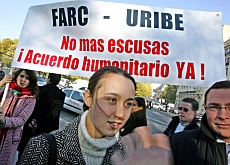
Cautious optimism ahead of Colombian talks

The Swiss foreign ministry and non-governmental groups are cautiously upbeat about the prospects of a humanitarian accord in Colombia.
Switzerland has offered its good services and observers for hostage talks between the Colombian government and leftwing rebels.
“The expectations are high, especially among the families of the hostages. There is a real chance to be taken now,” Swiss foreign ministry spokesman Lars Knuchel told swissinfo.
He stressed that an independent proposal – made jointly by Spain, France and Switzerland – should foster the trust needed between the conflict parties.
Attempts to reach a peace deal to end more than 40 years of civil war have been stalled since 2002.
The latest proposal is aimed at setting up a demilitarised zone in an area of southwestern Colombia. The temporary troop withdrawal is to ensure a safe environment for talks on the release of hostages and prisoners.
Concessions
The Armed Revolutionary Forces of Colombia (Farc) has been holding around 60 people, including the Colombian-French national Ingrid Betancourt, for several years.
The Marxist rebels want to exchange them for several hundred jailed leftwing militants.
Earlier this week the government of President Álvaro Uribe announced it was prepared to pull out troops from a small mountain area in the Valle de Cauca province.
The rebels, who have attached a series of pre-conditions to the talks, still have to respond to the latest proposal.
“Both parties make important concessions and their security concerns, which are perfectly legitimate, are addressed in the proposal,” said Knuchel.
“Therefore we sincerely hope that it will constitute the beginning of the real peace process all Colombians are striving for.”
Switzerland’s efforts are part of a mandate granted last year by the Colombian government and rebels.
Step by step
Bruno Rütsche of the Swiss-Colombian human-rights group, Ask!, has welcomed the latest move to break the deadlock in the stalled peace process.
“It is always a step-by-step approach in Colombia and we will have to see how thing go from here. Any effort is welcome and better than the current deadlock,” he said.
The International Committee of the Red Cross also supports the proposal, and has offered to help obtain the release of the hostages.
But Rütsche says it is very difficult to predict whether the rebels will agree, because paramilitary forces have a strong presence in the mountain region.
It is widely believed that the paramilitary units have close links with the army.
Under the plan between 30 to 40 international observers would monitor roads in and out of the village of El Retiro to ensure the zone is free of troops for the duration of the talks, as well as a week before and after.
Representatives of a Spanish, French and Swiss commission have offered to accompany the negotiating parties.
According to Rütsche, President Uribe is keen to show his willingness to re-start the peace process in the run-up to the presidential elections in May.
The authorities have already granted a controversial amnesty to paramilitary forces.
swissinfo
Over the past few years Switzerland has been involved in talks in a bid to mediate between rebel groups and the Colombian government.
In 2000, Switzerland hosted talks in Geneva between representatives of the leftwing National Liberation Army (ELN) and Colombia’s government.
In 2004 the Marxist Revolutionary Armed Forces of Colombia rebels (Farc) and the Colombian government asked the Switzerland to facilitate talks on a humanitarian accord and help re-launch the stalled peace process.
The Revolutionary Armed Forces of Colombia (Farc), the country’s biggest and most powerful leftwing rebel group, has been fighting the government for more than 40 years.
The rebels are holding about 60 hostages, including foreigners, and want to exchange them for hundreds of jailed Marxist militants.
Earlier this week the government of President Álvaro Uribe accepted a proposal for a demilitarised zone, but there has been no word from the Farc rebels.

In compliance with the JTI standards
More: SWI swissinfo.ch certified by the Journalism Trust Initiative





























You can find an overview of ongoing debates with our journalists here . Please join us!
If you want to start a conversation about a topic raised in this article or want to report factual errors, email us at english@swissinfo.ch.